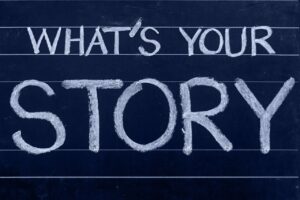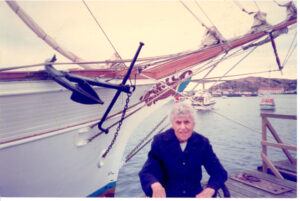This summer I was camping with a friend whose parents and grandparents were raised in the USA and whose son and grandchildren are alive and living not to far from him. Five generations and maybe more of family living in one country, speaking a common language, and spending time together. These family gatherings, like the one I was at, involved many stories. Stories of my friend’s youth and his parents and even grandparents adventures and life. Stories told casually over food. Bits and pieces of stories referred to as if everyone already knew the story and just a piece of it brought back the memories for them.
 This weaving of family stories is told from different perspectives, different voices, and in different versions. Stories told by aunts and uncles, great aunts and great uncles, cousins, and parents. Stories that the grandchildren listen to with big eyes inhaling the family mythology.
This weaving of family stories is told from different perspectives, different voices, and in different versions. Stories told by aunts and uncles, great aunts and great uncles, cousins, and parents. Stories that the grandchildren listen to with big eyes inhaling the family mythology.
These stories are reworked and woven into new stories that shape-shift through the generations. One gets the sense of ancestors as living breathing people whose stories are not fixed.
I grew up in a world without the stories of my ancestors, without aunts and uncles arguing about what happened in Göteberg in 1930 or how Great Aunt Karin (my namesake) dressed at her wedding (if she even married). The few times I met my Swedish grandparents, no stories were told due to language barriers, even though there was plenty of physical affection. Due to the Soviet Union, I was never even able to meet my Estonian vanaema (grandmother).
Growing up with immigrant parents who were the only people to come to the USA, I had very limited exposure to my ancestral stories. Even when we visited Sweden, most of the stories being told were told in Swedish and my Swedish isn’t good enough to comprehend the story plot, let alone the nuanced differences in the versions being told.
The land on which I lived was not the location of any of these stories from my parents’ childhood or my grandparents. While my mother shared her versions of family stories, there was no one to tell a different version, laugh with her about the memory, or tell a story my mother did not remember. As I tell stories with my sister, sometimes she doesn’t remember what I do and sometimes it’s the other way around. Often our memories of what happened are different.
 Instead of family gatherings where the stories were shared, I have boxes of photos of people, many of whom I don’t even know their names.
Instead of family gatherings where the stories were shared, I have boxes of photos of people, many of whom I don’t even know their names.
Is this the reason I tend to feel unmoored?
As the University of Nevada, Reno writes on their website:
A study about family storytelling found that “Family stories provide a sense of identity through time, and help children understand who they are in the world.” … Researchers found that when parents share family stories, children tended to view their family as stronger, their self-esteem was higher, they showed lower levels of anxiety or nervousness, they had fewer behavior problems and they were better able to deal with the effects of stress….Studies show that when parents use more details and emotions when talking about past everyday events, called elaborative reminiscing, with their preschool-aged children, the children told more detailed and coherent narratives one to two years later. These children also demonstrated a better understanding of other people’s thoughts and emotions. Family reminiscing, when families talk about their past experiences together, creates a shared history and helps maintain emotional bonds within a family.
I can’t recover the storytelling that my ancestors shared with my cousins. Yet even understanding the missing link is a clue to help me recover my cultural and familial past. As is often said, it’s the journey, not the destination that matters.